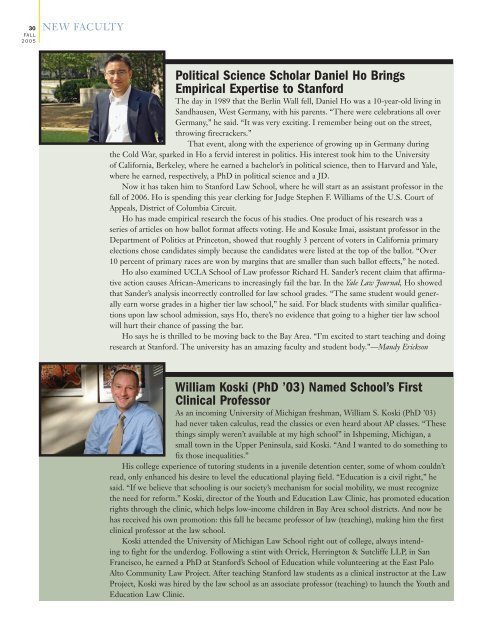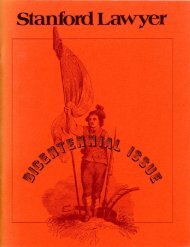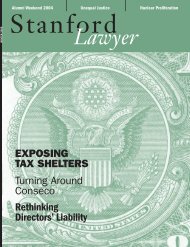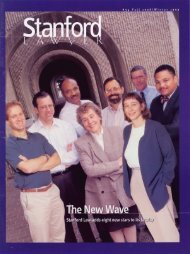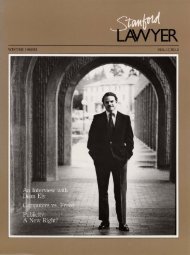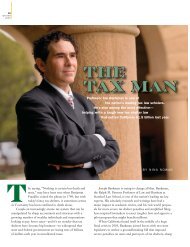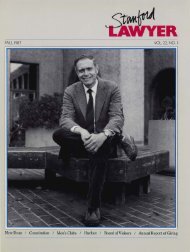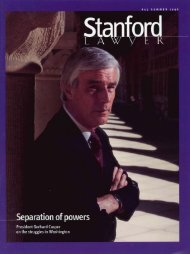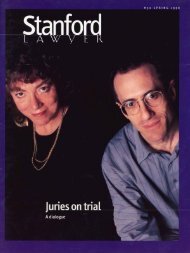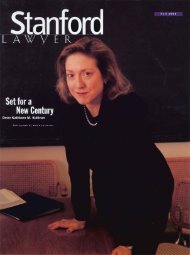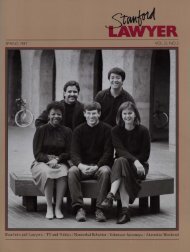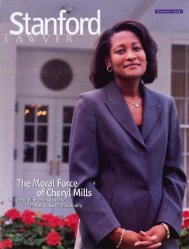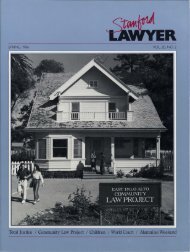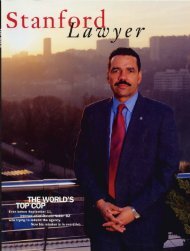Issue 73 - Stanford Lawyer - Stanford University
Issue 73 - Stanford Lawyer - Stanford University
Issue 73 - Stanford Lawyer - Stanford University
You also want an ePaper? Increase the reach of your titles
YUMPU automatically turns print PDFs into web optimized ePapers that Google loves.
30<br />
FALL<br />
2005<br />
NEW FACULTY<br />
Political Science Scholar Daniel Ho Brings<br />
Empirical Expertise to <strong>Stanford</strong><br />
The day in 1989 that the Berlin Wall fell, Daniel Ho was a 10-year-old living in<br />
Sandhausen, West Germany, with his parents. “There were celebrations all over<br />
Germany,” he said. “It was very exciting. I remember being out on the street,<br />
throwing firecrackers.”<br />
That event, along with the experience of growing up in Germany during<br />
the Cold War, sparked in Ho a fervid interest in politics. His interest took him to the <strong>University</strong><br />
of California, Berkeley, where he earned a bachelor’s in political science, then to Harvard and Yale,<br />
where he earned, respectively, a PhD in political science and a JD.<br />
Now it has taken him to <strong>Stanford</strong> Law School, where he will start as an assistant professor in the<br />
fall of 2006. Ho is spending this year clerking for Judge Stephen F. Williams of the U.S. Court of<br />
Appeals, District of Columbia Circuit.<br />
Ho has made empirical research the focus of his studies. One product of his research was a<br />
series of articles on how ballot format affects voting. He and Kosuke Imai, assistant professor in the<br />
Department of Politics at Princeton, showed that roughly 3 percent of voters in California primary<br />
elections chose candidates simply because the candidates were listed at the top of the ballot. “Over<br />
10 percent of primary races are won by margins that are smaller than such ballot effects,” he noted.<br />
Ho also examined UCLA School of Law professor Richard H. Sander’s recent claim that affirmative<br />
action causes African-Americans to increasingly fail the bar. In the Yale Law Journal, Ho showed<br />
that Sander’s analysis incorrectly controlled for law school grades. “The same student would generally<br />
earn worse grades in a higher tier law school,” he said. For black students with similar qualifications<br />
upon law school admission, says Ho, there’s no evidence that going to a higher tier law school<br />
will hurt their chance of passing the bar.<br />
Ho says he is thrilled to be moving back to the Bay Area. “I’m excited to start teaching and doing<br />
research at <strong>Stanford</strong>. The university has an amazing faculty and student body.”—Mandy Erickson<br />
William Koski (PhD ’03) Named School’s First<br />
Clinical Professor<br />
As an incoming <strong>University</strong> of Michigan freshman, William S. Koski (PhD ’03)<br />
had never taken calculus, read the classics or even heard about AP classes. “These<br />
things simply weren’t available at my high school” in Ishpeming, Michigan, a<br />
small town in the Upper Peninsula, said Koski. “And I wanted to do something to<br />
fix those inequalities.”<br />
His college experience of tutoring students in a juvenile detention center, some of whom couldn’t<br />
read, only enhanced his desire to level the educational playing field. “Education is a civil right,” he<br />
said. “If we believe that schooling is our society’s mechanism for social mobility, we must recognize<br />
the need for reform.” Koski, director of the Youth and Education Law Clinic, has promoted education<br />
rights through the clinic, which helps low-income children in Bay Area school districts. And now he<br />
has received his own promotion: this fall he became professor of law (teaching), making him the first<br />
clinical professor at the law school.<br />
Koski attended the <strong>University</strong> of Michigan Law School right out of college, always intending<br />
to fight for the underdog. Following a stint with Orrick, Herrington & Sutcliffe LLP, in San<br />
Francisco, he earned a PhD at <strong>Stanford</strong>’s School of Education while volunteering at the East Palo<br />
Alto Community Law Project. After teaching <strong>Stanford</strong> law students as a clinical instructor at the Law<br />
Project, Koski was hired by the law school as an associate professor (teaching) to launch the Youth and<br />
Education Law Clinic.


